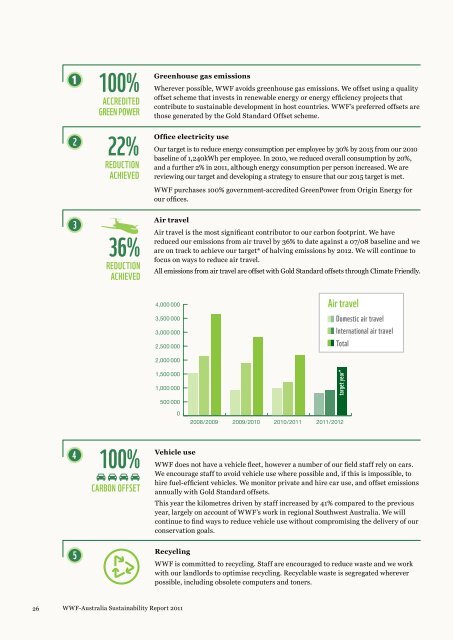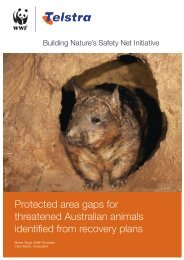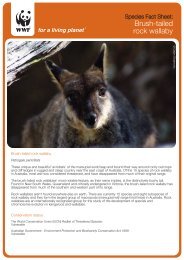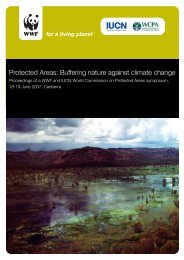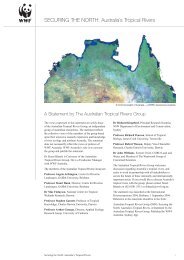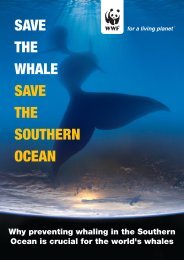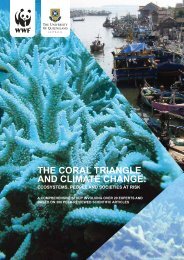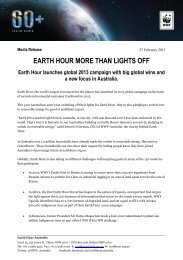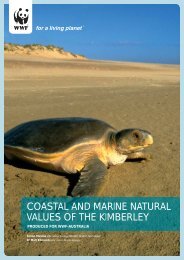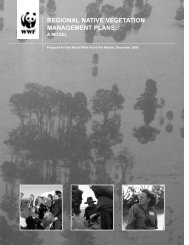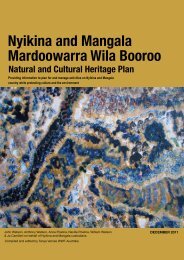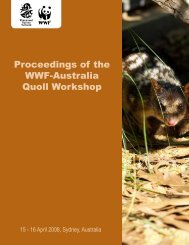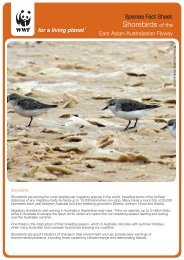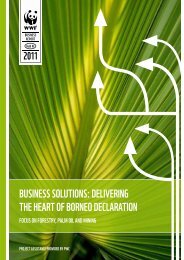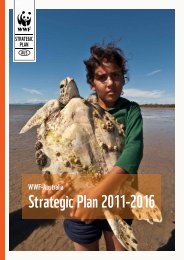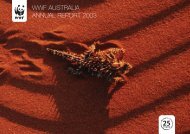WWF-Australia Annual Report 2011
WWF-Australia Annual Report 2011
WWF-Australia Annual Report 2011
You also want an ePaper? Increase the reach of your titles
YUMPU automatically turns print PDFs into web optimized ePapers that Google loves.
100%<br />
accredited<br />
green power<br />
22%<br />
reduction<br />
AChieved<br />
Greenhouse gas emissions<br />
Wherever possible, <strong>WWF</strong> avoids greenhouse gas emissions. We offset using a quality<br />
offset scheme that invests in renewable energy or energy efficiency projects that<br />
contribute to sustainable development in host countries. <strong>WWF</strong>’s preferred offsets are<br />
those generated by the Gold Standard Offset scheme.<br />
Office electricity use<br />
Our target is to reduce energy consumption per employee by 30% by 2015 from our 2010<br />
baseline of 1,240kWh per employee. In 2010, we reduced overall consumption by 20%,<br />
and a further 2% in <strong>2011</strong>, although energy consumption per person increased. We are<br />
reviewing our target and developing a strategy to ensure that our 2015 target is met.<br />
<strong>WWF</strong> purchases 100% government-accredited GreenPower from Origin Energy for<br />
our offices.<br />
36%<br />
reduction<br />
AChieved<br />
Air travel<br />
Air travel is the most significant contributor to our carbon footprint. We have<br />
reduced our emissions from air travel by 36% to date against a 07/08 baseline and we<br />
are on track to achieve our target* of halving emissions by 2012. We will continue to<br />
focus on ways to reduce air travel.<br />
All emissions from air travel are offset with Gold Standard offsets through Climate Friendly.<br />
Air travel<br />
Domestic air travel<br />
International air travel<br />
Total<br />
target year*<br />
100%<br />
carbon offset<br />
Vehicle use<br />
<strong>WWF</strong> does not have a vehicle fleet, however a number of our field staff rely on cars.<br />
We encourage staff to avoid vehicle use where possible and, if this is impossible, to<br />
hire fuel-efficient vehicles. We monitor private and hire car use, and offset emissions<br />
annually with Gold Standard offsets.<br />
This year the kilometres driven by staff increased by 41% compared to the previous<br />
year, largely on account of <strong>WWF</strong>’s work in regional Southwest <strong>Australia</strong>. We will<br />
continue to find ways to reduce vehicle use without compromising the delivery of our<br />
conservation goals.<br />
Recycling<br />
<strong>WWF</strong> is committed to recycling. Staff are encouraged to reduce waste and we work<br />
with our landlords to optimise recycling. Recyclable waste is segregated wherever<br />
possible, including obsolete computers and toners.<br />
26 <strong>WWF</strong>-<strong>Australia</strong> Sustainability <strong>Report</strong> <strong>2011</strong>


